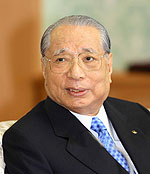
Welcome to the ezine produced by SGI Buddhists that prompts the positive, kindles the constructive, highlights the hopeful and leaves you feeling - well, up!

 A group of scientists, described by the media as 'the immortalists', met earlier this month to share theories on ways in which we human beings could extend our life span, writes Louise Ellis.
A group of scientists, described by the media as 'the immortalists', met earlier this month to share theories on ways in which we human beings could extend our life span, writes Louise Ellis.
The delegates attending the Strategies for Engineered Negligible Senescence (SENS) Conference see ageing as primarily an engineering problem. They believe the life span of the human body can be extended by replacing body parts as they wear out, and by upgrading the body's biochemistry as problems emerge. They think that such procedures will become commonplace two or three decades from now, enabling people to live to at least 125 years old and beyond.
A growing group of scientists across the world have come to similar conclusions. In his book 'Grow Younger, Live Longer', Deepak Chopra, medical doctor and philosopher, explains three different ways for categorising a person’s age.
The first is chronological age, which is determined by your birth date. However, the more important measure of age is biological age, which is defined by how well your physiological systems are functioning. These are quantified by 'biomarkers' which include a range of measurements including blood pressure, body fat, hormone levels and bone density. A fifty-year-old who takes good care of herself could have the biology of a thirty-five-year-old. However, a bad lifestyle could result in a biological age older than her birth years.
The third measure of age is psychological age, which is your subjective experience of how old you feel. This is very closely linked to biological age, because when the body is functioning efficiently, we are more likely to feel energetic and full of life.
 In his book, Chopra gives practical advice on how to reverse our biological age, through lifestyle changes, including improving nutrition, exercise, eliminating toxins, sleep patterns, learning to cope with stress, and having more creativity and fun in one’s life. He writes: 'The conditioning of our society leads us to believe that, as we grow older, we deteriorate physically and mentally. When you break out of this conditioning, you will learn from your own experience that every day in every way you can increase your physical and mental capacity.' ('Grow Younger, Live Longer', Deepak Chopra, Random House, 2001, p. 20)
In his book, Chopra gives practical advice on how to reverse our biological age, through lifestyle changes, including improving nutrition, exercise, eliminating toxins, sleep patterns, learning to cope with stress, and having more creativity and fun in one’s life. He writes: 'The conditioning of our society leads us to believe that, as we grow older, we deteriorate physically and mentally. When you break out of this conditioning, you will learn from your own experience that every day in every way you can increase your physical and mental capacity.' ('Grow Younger, Live Longer', Deepak Chopra, Random House, 2001, p. 20)
The elimination of toxins as the prerequisite for healing was central to the thinking of many doctors over a century ago. Doctors such as Dr John Harvey Kellogg, who invented the famous cornflake, believed that a low fat, high fibre diet was crucial for a healthy digestion, which would eliminate disease-causing toxins from settling in the intestine.
Dr Bernard Jensen, an associate of Kellogg, wrote many fascinating books about the links between intestinal toxemia and disease. In 'Dr Jensen’s Guide to Better Bowel Care', published in 1908, he wrote extensively about examples of links between disease and slow movement of putrefying food through the colon. He describes an experiment carried out on chicken embryo tissue in 1912 by Nobel prize winner Dr Alexis Carrel which demonstrates the potential for a cell to live indefinitely under suitable circumstances.
The living tissue on slides was rinsed daily in a solution which gave them nutrient and cleaned away their waste products. Every day the solution was changed, and the tissue cells lived for twenty-nine years. They died one day only because the laboratory assistant forgot to change the rinsing solution. Dr Carrel concluded, 'The cell is immortal. It is merely the fluid in which it floats which degenerates. Renew this fluid at intervals, give the cell something upon which to feed and, so far as we know, the pulsation of life may go on forever.' ('Dr Jensen’s Guide to Better Bowel Care', Dr Bernard Jensen, Penguin Putnam, p.43)
Living forever might seem like an attractive prospect, giving so much time to do all those things we want to do. However, how we use our time is often as important as the amount we have. Buddhist philosophy offers the theory that time can almost seem elastic, depending on our state of mind, perception, and how we use our time. A day of meaningless activity can flash past, while an afternoon engaged in a creative activity can stretch forever. In essence, Buddhism argues that through living an enlightened life, one can awaken to a sense of timeless eternity within each moment.
 In 'Life: An Enigma, a Precious Jewel', Dr Daisaku Ikeda (President of the Buddhist organsation SGI) writes, 'If we live each present moment meaningfully, the infinite past and the infinite future will enrich our lives with a constant flow of the cosmic life-force. One moment in our lives will become a manifestation of the Mystic Law, which includes all time, and in that sense this one moment in itself becomes eternity, our life-flow fusing indelibly into the life-flow of the cosmos.' ('Life: An Enigma, A Precious Jewel', Daisaku Ikeda, Kodansha International, p.74)
In 'Life: An Enigma, a Precious Jewel', Dr Daisaku Ikeda (President of the Buddhist organsation SGI) writes, 'If we live each present moment meaningfully, the infinite past and the infinite future will enrich our lives with a constant flow of the cosmic life-force. One moment in our lives will become a manifestation of the Mystic Law, which includes all time, and in that sense this one moment in itself becomes eternity, our life-flow fusing indelibly into the life-flow of the cosmos.' ('Life: An Enigma, A Precious Jewel', Daisaku Ikeda, Kodansha International, p.74)
It seems to me that the ideal to strive for is to lead a long and healthy life, where we are connecting to the universal life-flow through Buddhist practice, and contributing to creating a healthier and happier world.
CLICK HERE to read the full story about the scientific breakthroughs proposed by the so-called "immortalist" scientists at the SENS Conference, which could prolong the life span of human beings.

